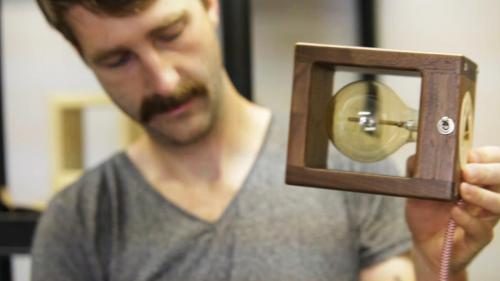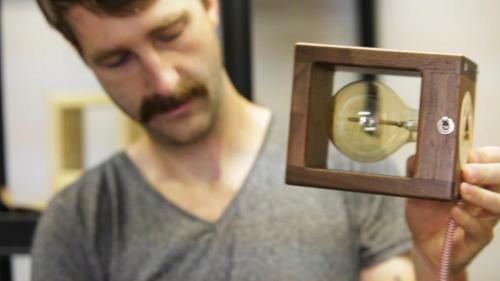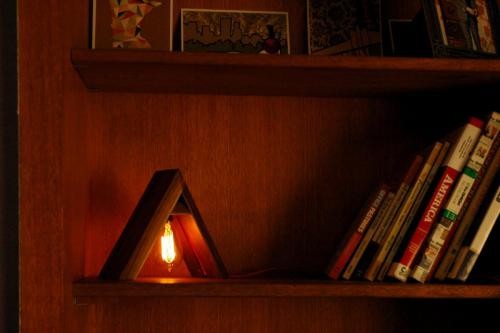
A dozen years have passed since urban theorist Richard Florida argued that the U.S. has “an economy powered by human creativity.” In The Rise of the Creative Class, Florida writes, “In virtually every industry, from automobiles to fashion, food products and information technology itself, the winners in the long run are those who can create and keep creating.”
With the Great Recession lingering in our rearview mirrors and economists warning that many jobs lost in the millennial scourge are gone for good, I would argue that many in the “creative class” have dug in their heels even deeper to form the hyper-niche of the “artisan class.”
Take Erol Chandler for one. The Montana-born, Portland-educated former 8th-grade science teacher left the field of education last year, moved to Eugene and started making artisanal lamps.
“I wanted to downsize,” Chandler tells me sitting at the bar of The Barn Light, which displays some of his lit creations nestled between bottles of booze. “The school system and bureaucracy bummed me out too much.”
Chandler has the air of an artisan in the 21st century: plaid-clad, slightly rustic, mustachioed with a five o’clock shadow — what I imagine Will Forte would look like if he were cast in a Wes Anderson flick.
“I’ve always worked with my hands,” Chandler says.
Before seeing the light, he was a long-haul truck driver; he laid wood floors, got two masters in education (OK, he’s a class short of one, he concedes) and worked as an excavator in Eugene.
During last winter’s lull in construction and excavation projects, and after hours spent tinkering in his garage and his buddy’s woodshop, Chandler decided to commit to the creative endeavor full-time.

He was also inspired by the rise in popularity of old-timey Edison bulbs seen in shops such as Portland’s Schoolhouse Electric. He noticed these bulbs, which give off a muted amber glow, look great without a lampshade.
“There was so much more you could do,” he says. And thus Chandler started his line of lamps, A-Lamp, featuring compact, minimalist wooden square and A-frames — named Type O and Type A respectively — that act as sort of cradles for the bulbs. Some are done in walnut, poplar and alder wood, while others gleam with colorful lacquers.
The lamps use nickel-plated toggle switches and thick, woven cotton cords, hinting at a bygone era. Every lamp is handmade by Chandler.
Chandler describes his line as clean, elegant, simple. “I love things that your mind sees and instantly makes sense of,” he says. “It’s an art piece, but it’s functional.”
Heritage Dry Goods, a boutique on Willamette downtown, was the first to carry the A-Lamp line, beginning in October. Two Portland shops, Boy Fort and Animal Traffic, began selling the lamps in January.
But Chandler’s primary focus and moneymaker is selling the lamps from his online store, where buyers can customize their lights — although Rejuvenation, a home and retro hardware store in Portland, just put in an ordered for 300.
For Chandler, however, the goal is not to mass-produce his product, but to streamline a sort of batch production, so that every lamp, even those that are part of large orders, is still built by him.

There is a fine balance between artisanal batches and keeping a business afloat. “People either like them or they don’t,” Chandler explains of his minimalist designs. So as a small business still finding its footing, he says, “I need to have them be seen by a lot of people.”
Eventually, he’d love a storefront in Eugene to sell his line as well as custom furniture, which he makes in his off time. And like many in the creative and artisanal classes today, Chandler has turned to Kickstarter for some financial oomph and social media buzz. He hopes to turn A-Lamp “into a national brand that remains handmade in the U.S,” he writes on the Kickstarter page.
And in a town like Eugene, he has good company. Look at the creative niche industries that have sprung up or grown with the help of crowd-sourced funding — The Barn Light, The Boreal, Harmonic Laboratory, Bijou Metro, Red Wagon Creamery, Party Downtown, Wild Squirrel Nut Butter, Doug’s Nuts, a handful of craft breweries and food carts-turned-restaurants and many more.
Which brings to mind Richard Florida again. “The creative individual is no longer viewed as an iconoclast,” Florida writes in Creative Class. “He — or she — is the new mainstream.”
For more information, visit www.kickstarter.com/projects/alampdesign/simple-modern-lamps-handmade-in-oregon